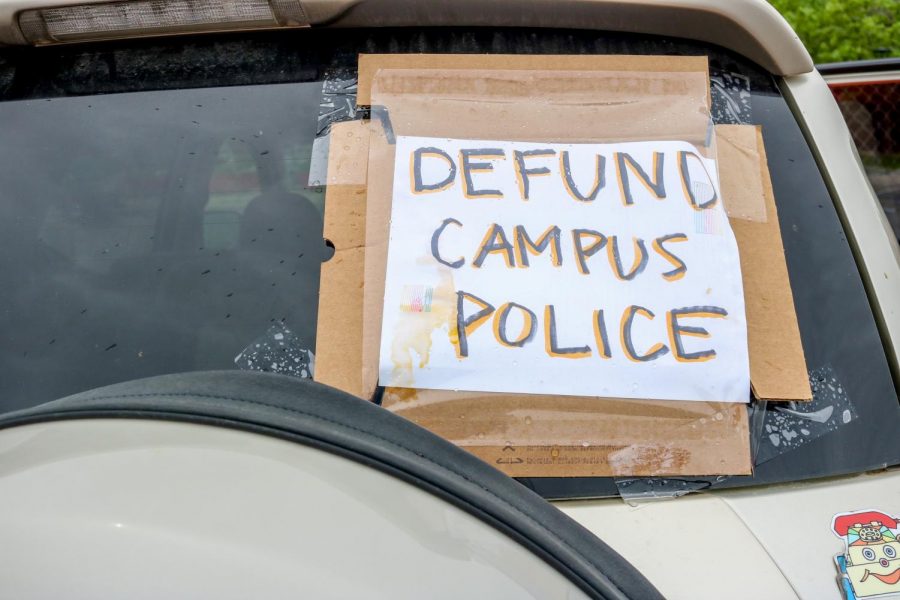Barron: Defund, Not Abolish, the UUPD
Protesters gather at Guardsman Way to demand justice for victims of police brutality in Salt Lake City on June 6, 2020. (Photo by Ivana Martinez | The Daily Utah Chronicle)
June 15, 2020
Following nationwide calls to defund the police and reallocate resources to invest in community services, UnsafeU, a student safety organization that has championed police reform at the U, has called for the abolishment of the University of Utah Police Department. According to the organization, student testimony to the failures of UUPD, increased community support for “reimagin[ing] what safety means” and limited improvement within UUPD has prompted this shift in their advocacy. Resources should be reallocated from UUPD’s budget to improve mental health and victim services for students, but completely abolishing campus police will not protect U students.
Back in January, it was revealed that the UUPD spent almost $6,000 on Chief Dale Brophy’s retirement party in October 2019. As students voiced outrage at the excess of this party, Communications Director Chris Nelson was quick to note that the money had been specifically budgeted for UUPD employee events and claimed it would not be used elsewhere. While UUPD’s extravagant party money should be reallocated, it is not the only part of the UUPD’s budget that should be cut. As highlighted in UnsafeU’s demands for abolishment, the majority of on-campus crimes are substance-related, which can be better addressed with public health interventions than arrests. Students would be better served if the majority of UUPD’s budget was diverted to provide less punitive, and more health-focused initiatives to address substance-related crimes on campus.
Based on the recommendation of the independent review team investigating UUPD’s handling of Lauren McCluskey’s case, the U approved a new $13 million facility to house campus police which was scheduled to break ground this fall. Some students told investigators that the current police building was off-putting and in an odd location, but McCluskey had no issue finding UUPD, her death was caused by officers’ inaction. Sadly, another investigation found that McCluskey’s experience was not isolated — UUPD has a history of mistreating victims and ignoring reports of sexual violence. If U leadership truly wants to change student attitudes on campus safety, they should reallocate funds to build a wellness center for victim-survivor advocates and mental health professionals. Paired with university actions to improve victim-police interactions, creating a wellness center will increase victims’ access to support on campus.
Arguing for UUPD abolishment, UnsafeU claimed ChenWei Guo might still be alive if campus police had been dissolved and other resources had been made available. UnsafeU representatives, Devon Cantwell and Rebecca Hardenbrook, stood by this comment during an email interview, “We could have prevented this sort of crime from happening to a student on our campus if we were considering safety measures other than relying on police presence.” However, it remains unclear exactly how proposed resources like a SafeBus or safety escorts could have prevented Guo’s murder as he was in his car with another student when he was shot. Violent crimes are uncommon on campus, but they do occur and are not always preventable. Law enforcement is still needed on campus to hold violent perpetrators accountable.
According to Cantwell and Hardenbrook, if UUPD was dissolved, UnsafeU would support campus becoming a part of another policing jurisdiction. However, utilizing a police force not beholden to campus leadership may diminish police receptivity to student opinions. Progress towards reforming our campus police department has been slow, but university leadership has begun responding to student advocacy. Last school year, the U hired Marlon Lynch as the Chief Safety Officer and Rodney Chatman as the Chief of Police. Lynch and Chatman released a joint statement in the wake of George Floyd’s death committing to “divorce [UUPD] from traditional policing methods that have resulted in inequities, biases and the mistreatment of underrepresented communities and communities of color.” Dissolving UUPD now may actually harm efforts to “reimagine” policing on campus.
During an ASUU Senate hearing this past spring semester, students from minority communities made it clear that an overt police presence on campus makes them feel unsafe — which is understandable as police in the United States have a history of targeting Black, indigenous and people of color. By reallocating funds to provide additional resources that better address substance-related crimes and support victims, police on campus will be reduced to the bare minimum law enforcement required to hold violent perpetrators accountable. As defunding police departments will not end racist policing, students and organizations like UnsafeU need to continue advocating to reform what remains of UUPD to ensure student concerns are taken seriously and BIPOC students are not discriminated against.








